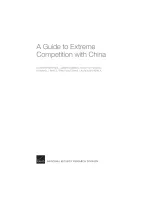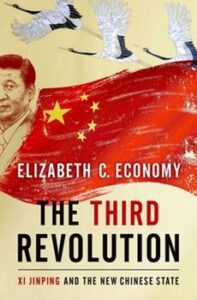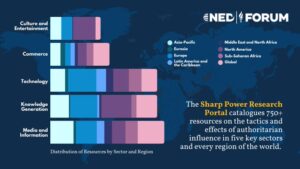The new strategic competition requires “rebuilding traditions of democratic cooperation across party lines in recognition that the United States will not be able to meet the China challenge if U.S. political leaders are more focused on fighting each other than on competing with China,” according to a new report.
“The CCP has grasped from its very inception that stability at home depends in part on control of the narrative, the stories told and accounts offered about domestic and international events as they unfold, the actors involved, and the motives of those actors,” RAND researchers Christopher Paul, James Dobbins, Scott W. Harold, Howard J. Shatz, Rand Waltzman, and Lauren Skrabala write in A Guide to Extreme Competition with China.
 “Post-Mao China has exhibited a marked indifference to the ideologies of its neighbors, trading partners, and aid recipients, prioritizing its own direct benefit over altering the composition of foreign systems of government,” the report adds. “Rather than selling China’s unique system of government to other states, such messages are intended to undermine regard for ‘the American way’ and to convince Chinese audiences that the CCP offers the best form of rule while attracting potential partners through its purported success, reliability, and trustworthiness”:
“Post-Mao China has exhibited a marked indifference to the ideologies of its neighbors, trading partners, and aid recipients, prioritizing its own direct benefit over altering the composition of foreign systems of government,” the report adds. “Rather than selling China’s unique system of government to other states, such messages are intended to undermine regard for ‘the American way’ and to convince Chinese audiences that the CCP offers the best form of rule while attracting potential partners through its purported success, reliability, and trustworthiness”:
Sustained social and political susceptibility to foreign interference and impressions of U.S. democracy’s fragility position China as a potentially attractive development model that is ready to provide large-scale investment and assistance. The Soviet economy was autarkic, a closed system incapable of helping others develop a modern economy or of being helped. In contrast, trade with China is generally mutually beneficial, even when those benefits flow unequally. China thus has more to offer the world than the Soviet Union ever did.
 China’s new assertive authoritarianism poses a distinct challenge to the current liberal international order, notes Elizabeth Economy, Senior Fellow at Stanford University’s Hoover Institution and author of The Third Revolution: Xi Jinping and the New Chinese State. The country is exporting elements of its authoritarian model globally and seeking to enhance the role of the state relative to individual rights and freedoms, as well as to prevent international actors from voicing perspectives or taking actions that deviate from Beijing’s preferences, she writes for Democracy: A Journal of Ideas:
China’s new assertive authoritarianism poses a distinct challenge to the current liberal international order, notes Elizabeth Economy, Senior Fellow at Stanford University’s Hoover Institution and author of The Third Revolution: Xi Jinping and the New Chinese State. The country is exporting elements of its authoritarian model globally and seeking to enhance the role of the state relative to individual rights and freedoms, as well as to prevent international actors from voicing perspectives or taking actions that deviate from Beijing’s preferences, she writes for Democracy: A Journal of Ideas:
Beijing has achieved some clear successes, for example, strengthening the capabilities of some authoritarian leaders in Africa and curtailing the willingness of many multinationals to identify Taiwan or the South China Sea as separate from mainland China. However, Beijing has also fallen short in achieving several of its objectives. For example, Beijing targeted the establishment of 1,000 CIs by 2020 but instead realized only slightly more than half that number. … many universities ultimately determined that the Chinese government’s demands for secret contracts and control over the teachers and curriculum was ill-suited to the values universities prize, such as transparency and the rule of law.
Two of China’s most prominent human rights lawyers, Xu Zhiyong and Ding Jiaxi, are expected to face trial at the end of this year on charges that they called for more civil liberties, according to Jerome Cohen, a law professor specializing in China at New York University, The Times reports:
A Chinese employee of Bloomberg News in Beijing has remained in detention for a year, as of Tuesday, with almost no word about the accusations against her. Under Mr. Xi’s rule, intellectuals are now warier of speaking their minds in China than at practically any time since Mao Zedong died in 1976.
 “This is an extraordinary time in the Chinese experience,” Mr. Cohen said. “I really think that the totalitarianism definition applies.”
“This is an extraordinary time in the Chinese experience,” Mr. Cohen said. “I really think that the totalitarianism definition applies.”
The poet Liao Yiwu, has collaborated with a Taiwanese team in Germany to produce The Second Massacre, a film dedicated to the fallen Hong Kong, with subtitles in English, German, French and Chinese (see below).
• Expand the organizational infrastructure to publicly disseminate messages of condemnation and to discredit Chinese propaganda and coercion among domestic and international audiences—activities under the banner of retaliation, reciprocity, and deterrence. Messaging campaigns should be coordinated centrally by some successor organization to the U.S. Information Agency, which oversaw counterpropaganda efforts during the Cold War. Partnerships with media outlets and even public relations firms would help target specific audiences with specific messages and shows of U.S. strength and support in resisting Chinese influence.
• Send credible messages backed by a comprehensive understanding of United Front activities. Again, the United States would benefit from a coordinated, centralized mechanism to collect this type of intelligence and ensure that it can be acted on swiftly. The skills and tools to create a United Front tracker are already in the U.S. private sector.
 The CCP views Chinese diaspora communities as owing their loyalty to the CCP and goes to great lengths to enforce this expected loyalty. These communities should be supported in their efforts to resist CCP coercion, the RAND researchers suggest:
The CCP views Chinese diaspora communities as owing their loyalty to the CCP and goes to great lengths to enforce this expected loyalty. These communities should be supported in their efforts to resist CCP coercion, the RAND researchers suggest:
- Such support should extend to independent media outlets broadcasting in Mandarin, as well as other dialects and languages spoken in China.
- Radio Free Asia’s reporting should extensively cover and expose United Front activities for the diaspora communities in China’s near abroad.
- Worldwide, the United States should work with international democratic partners to support independent journalism by members of the Chinese diaspora through a combination of public and private funding. RTWT
 Former NED Penn Kemble fellow and Heritage expert Olivia Enos interviews Etienne Soula on the Alliance for Securing Democracy (ASD)’s Authoritarian Interference Tracker. Etienne is a research analyst with the ASD and spearheaded the expansion of the tracker to cover over 150 incidents of Chinese interference in Europe and North America.
Former NED Penn Kemble fellow and Heritage expert Olivia Enos interviews Etienne Soula on the Alliance for Securing Democracy (ASD)’s Authoritarian Interference Tracker. Etienne is a research analyst with the ASD and spearheaded the expansion of the tracker to cover over 150 incidents of Chinese interference in Europe and North America.
China’s malign influence operations were featured in the National Endowment for Democracy’s International Forum’s event on “Resisting Sharp Power: Strengthening the Fabric of Open Societies” (above) with introductory remarks from the Forum’s John Glenn and a panel discussion with Dominika Hajdu (Slovakia), Ttcat (Taiwan), George Sarpong (Ghana) and Jessica Ludwig (USA), moderated by the International Forum’s Kevin Sheives.
The International Forum’s newly launched Sharp Power Research Portal features easily accessible cases and analyses of the scale and impact of authoritarian sharp power. The International Forum also published the Sharp Power and Democratic Resilience Series that examines how authoritarian regimes manipulate the political landscape and censor independent expression within democratic settings.







